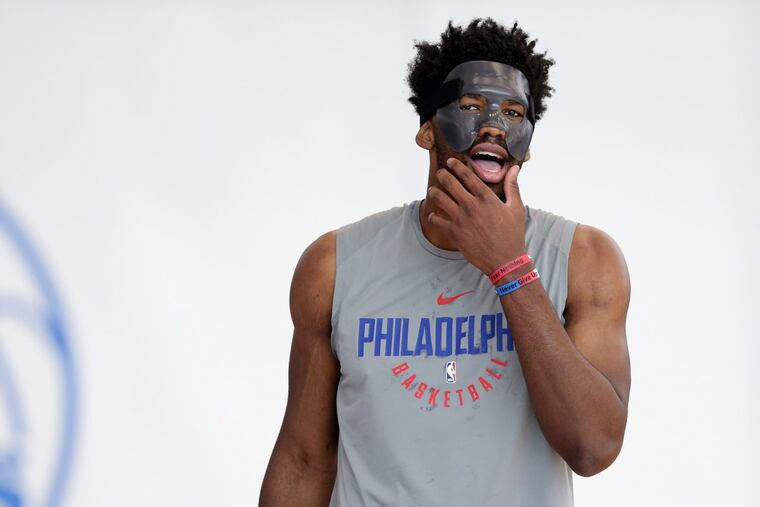Sixers need Joel Embiid to contend, but not to beat the Heat | David Murphy
Despite an ugly Game 2 loss to the Heat, the Sixers are clearly the better team in the series. They will be even better once Joel Embiid returns.

MIAMI — There is no question that the Sixers need Joel Embiid. If he is on the court Thursday night when the lights go up on Game 3, the Sixers will be infinitely better equipped to extend this postseason trip by at least another round. There is no question about that. And there never was, despite the occasional eyebrow you may have seen raised in response to the Sixers' 9-0 stretch without him before Monday's loss to the Heat.
Nothing about what happened in Game 2 changes the calculus regarding the importance of Embiid's presence on the court. Without him, the Sixers were plenty capable of racking up arcade offensive numbers while running inferior teams off the court. In this, they were like Chip Kelly's offense when matched up against an unfamiliar, undertalented team.
As good as Embiid is, he is even better than our layman's baseline is calibrated to comprehend. There is no tidy way to quantify his impact on the court, mostly because our most accessible metrics are tilted to favor offense. Embiid is a remarkable offensive player, and perhaps numbers like points and rebounds and shooting percentage do him justice on that end. But it is his defensive presence around the rim that transforms the dynamics of a game.
[ The process behind 'The Process:' Analytics-driven Sixers ride the numbers to NBA playoffs ]
The magnitude of that transformation can only be inferred. But the lines between the numbers tell a heck of a tale: When Embiid was off the court during the regular season, the Sixers allowed opponents to score an average of 107.7 points per 100 possessions, or about 1.2 points better than the league's median average. Not bad, until you consider that when he was on the court, the Sixers held opponents to just 102.7 points per 100 possessions, which was 1.2 points better than the team that finished with the best mark in the NBA (the Celtics, who held opponents to 103.9 points/100). All of the available numbers unfold in a similar manner, including effective field goal percentage, which showed opponents shooting 51 percent when he wasn't on the court and 47 percent when he was.
Consider Game 2. The Sixers' most obvious failing came on offense in the face of the Heat's personal-space-affronting defensive pressure. But on the other end of the court, they allowed 113 points to a team that had reached that number in just 16 of 82 games during the regular season. The Heat also shot an effective .488 from the field, 33 points better than their regular-season average.
Game 2 was an exhibit, not a lesson. The Sixers already knew what kind of impact Embiid could have on a seven-game series. The only thing that might have changed is their conceptualization of their own mortality now that they have a 1-1 series tie staring them in the face.
To the rest of us, the biggest takeaway from the first two games of the series is that, with or without their big man, the Sixers are the better team. Maybe that spoils the dramatic tension a neutral observer might derive by convincing themselves the Heat suddenly have "the momentum." But let's be real about what went down on Monday night in Miami's 113-103 win. Aside from the 34-13 whupping they took in the second quarter, the Sixers outscored the Heat 90-79. Granted, the NBA doesn't dole out wins by quarter, and the Sixers didn't exactly look like the Warriors the rest of the time. Still, it's hard to rewatch the game and think the end result was anything other than a team that was momentarily stunned by its opponent's physicality and then shot too poorly to overcome it.
In particular, the shooting variable can't be ignored. As good as the Sixers were in Game 1, knocking down 18 of 28 from three-point range, that's how bad they were in Game 2. Only twice in NBA playoff history has a team attempted at least 36 three-pointers and converted fewer than 20 percent. The Rockets did it against the Thunder last postseason, and the Sixers did it on Monday night, shooting just 7 for 36 for an abysmal 19.4 percent.
While some of those shooting struggles were no doubt attributable to the defensive pressure they faced, there was also some flukiness involved: a wide-open corner three that Dario Saric airballed, a JJ Redick jumper off a screen that he knocked down several times in Game 1 but wouldn't fall in Game 2. It might not have been pretty, but if the Sixers had shot even 33 percent from three, they probably would have won. Because they didn't, the Heat's ability to knock them out of their rhythm proved decisive. The Sixers got punched in the mouth, and that rattled them, and then it provoked them into a different style of play.
With Embiid, the Sixers would have had a different way to respond, and that certainly could have made a difference. Even without him, though, they remain the superior team. That's not always the team that wins the series. But it's an encouraging thought, given what they should soon have coming out of the bullpen.